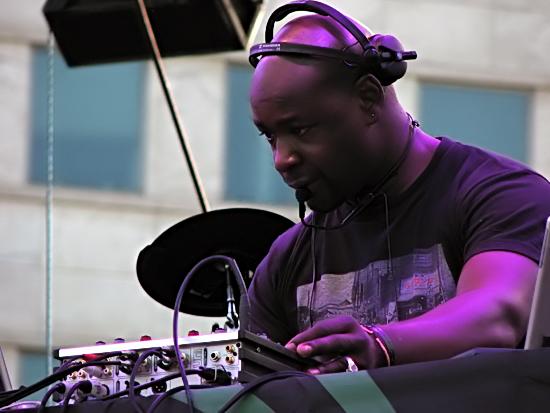| CW Interview: A Guy Called Gerald in a City Called Beijing | |
 |
City Weekend 2nd April 2009 Weblink |
 Hailing from Manchester, UK, one of the club scene's birthplaces, A Guy Called Gerald has been in the biz for over 20 years. Gerald is the godfather of the UK's 1980s acid house revolution and has been churning out creative, dance-friendly music ever since. Gerald's special brand of techno and tech house bumps and grinds its way into Beijing this Friday (April 3) at Tango. First of all, what are some of your thoughts on your gig in Beijing? Shanghai was unexpected. The actual crowd I didn't expect to be into it as much they were. A lot of the music I heard was more mainstream, so I thought my music would go over their heads, but you can never underestimate people. My impression so far is that Beijing seems more grounded and blue-collar than Shanghai, rather like Manchester (where I'm from) is in relation to London or Osaka to Tokyo. China is relatively "young" when it comes to electronic music. Asia, more broadly, sometimes trends toward a harder techno sound. How do you see your music fitting into the Asian dance music scene? I see my music as being more of a small niche and more specialist - aimed at the more discerning listener, someone who wants to take something home with them. What has been your favorite gig you've played in Asia, and in China in particular, if possible? I've done two gigs in Shanghai. The last one at Babyface was by far the best gig. If including Japan, then Wire. You've cited your background -- your Jamaican roots, your pentacostal church attendance as a youngster -- as a big influence on your music. Do you still feel that today? If so, how does your background manifest itself in your sound? I feel a sense of melody is definitely from my background. I grew up with music 24 hours a day. Every Sunday there was a live band on in the church. So I was brainwashed with music and now I'm addicted to it. And I just find myself whistling tunes I've just made up and not heard before. In the 21 years I've still not come across writer's block, and I've resorted to buying 2 computers so that I can write two tunes at the same time, but it's still not helping! You've been in the business for quite sometime, establishing yourself as one of the few artists that can maintain a sense of freshness and longevity in what is often a fickle environment that sees a lot of turnover. What do you think have been some of the keys to your success and staying power? Not getting involved with the riffraff (Just kidding!). Focusing more on the music than the fashion. Always trying to do something a little bit new. Keeping an individual spirit in what you're doing. Simple really. While you came of age in the UK scene, you moved to NYC about ten years ago? How do you think the move affected the music you make and play? I moved to NYC in 1997. It was the first time I had lived outside of the UK. It was a good time for me to go. British dance music at the time was going through a reinventing-itself period and I had actually had enough of the whole scene and wanted to do something new and try something new. I went to live like a monk for a few years. I didn't know about the stuff that was going on in England. That helped me out because I realized at that period that I didn't want to be classed as some kind of genre, and being outside of it I could see how the music that you made could be manipulated by the media and not the other way round. Living in America was like being able to see the wood for the trees. How do you define a successful gig? A successful gig is when I can feel the sound in my stomach and people are responding to the music. I can hear people feeling it when I take it down really low. I'm not into it when people are cheering. A really cheap trick some DJs do is put their hands up in the air and everyone starts cheering. They'll project towards the crowd in some way and everyone cheers. Sometimes they need that feedback from the DJ anyway. Electronic music is sometimes seen as all over the map these days, and some of it has been criticized as not being "danceable." Your music can be seen as quite the opposite, very dance-friendly. How important do you think the music-dance connection is? It's as important as having edible food. Music should be danceable. If people feel awkward and floating around because they're waiting for some signal how to move to the music then it should be readdressed. What's up next for you in terms of releases or touring plans? I'm slowly re-mastering all my material from the past 21 years and going to make it as suitable as possible for download, and also doing a samples CD for producers. Going to rebuild my studio in Berlin in a new location and basically continue to tour live in Europe and hopefully more in Asia. Check out A Guy Called Gerald's tunes here. For more info, visit his MySpace page. DETAILS A Guy Called Gerald at Tango on Friday, April 3, 10pm [Author: c_marie] |
|